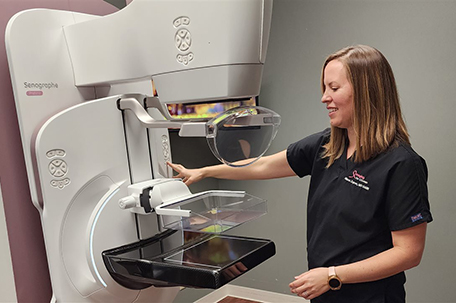
BPT
Mammograms are important standard health screenings that help detect breast cancer as early as possible when treatment is typically most effective. Yet for many women, it can be unclear as to when to start getting these screenings and they may face numerous barriers to doing so – such as cost, time or feelings of discomfort and anxiety.
Dr. Allison Zupon, co-owner of Women’s Imaging Center in Kansas City, Missouri, helps shed light on the current landscape of mammograms and breast cancer screening and why it is critical for women to prioritize these appointments. As an imaging specialist, she spends her days reading mammograms and ultrasounds, performing biopsies, and supporting women’s access to personalized care.
“Taking care of women has always been a passion of mine because so often they take care of everybody else around them and not themselves. This includes advocating for women to ensure they are getting the proper information and care they need,” said Zupon.
Zupon recommends standard mammogram screenings start for women at age 40. “In order to prioritize women’s health and survival, mammogram age should be 40,” Zupon said. This reflects the recent updated guidance from the U.S. Preventive Services Task Force that says the same thing, lowering guidance from age 50.
When a woman receives a mammogram, the images are reviewed by someone like Zupon and categorized as normal, abnormal, or inconclusive. If not normal, you may require another mammogram or further testing. The reasons can vary greatly – including having dense breast tissue that is difficult to image or an abnormal pattern in the tissue that is flagged.
Traditional 2D mammograms are a fundamental part of women’s health care, but Zupon said, “If you’re getting a mammogram and have dense breast tissue, mammograms are really not enough and a supplemental screening is highly recommended.”
Zupon and her colleagues rely on additional technology to provide timely, personalized care to everyone. “To have effective care, you have to have a suite of imaging options in order to tailor each woman’s screening exam,” she said. For example, 3D mammography provides a more detailed look at breast tissues. They also use GE HealthCare’s contrast-enhanced mammography (CEM) which uses an injected dye to examine breast tissue and flag abnormalities with high levels of sensitivity and specificity, as well as automated breast ultrasound (ABUS) which is specifically designed for detecting cancer in dense breast tissue. If required, biopsies – which take a small sample of tissue from the patient – can also provide critical information.
These kinds of technologies give healthcare teams important information to properly diagnose cancers and determine treatment options. As a proponent of personalized care, Zupon and her colleagues try to do as much as possible at the first appointment so that patients can leave with answers in the same day. “Having same-day workups can help get patients that need treatment on the right path as soon as possible,” she noted. “For those who do not require treatment, this can also help eliminate anxiety that can build if a patient needs to come back for additional follow up scans.” However, for patients with dense breasts, this supplemental screening is not always covered by insurance. While there is legislation in progress to help address this, Zupon continues to advocate for this to become a standard of care across the U.S.
“It’s clear to me that if a certain procedure only works for some but not all women, change is needed,” Zupon stressed. “We are trying to find cancers at their smallest, earliest and most treatable stages, and in order to provide the most effective care, it needs to be accessible, affordable and tailored to them.”
Zupon prioritizes having open, ongoing conversations with patients throughout their health care journey, providing options so they can make the right choices for themselves. “I feel good about providing a spectrum of care options to patients and look forward to many more years of supporting women’s health.”
To learn more about breast care options, visit: GEHealthCare.com.

















Leave a Comment